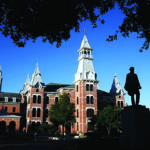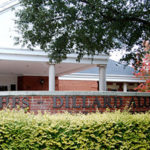WACO—About one-third of the Baylor Alumni Association board of directors—including four officers—resigned in the wake of a failed attempt to approve a transition agreement with Baylor University.
 Collin CoxBaylor Alumni Association President Collin Cox, a Houston attorney; President-elect Si Ragsdale of Childress; Secretary Kyle Gilley of Sioux Falls, S.D.; and Past President Elizabeth Coker, a district judge from Livingston, resigned from the board.
Collin CoxBaylor Alumni Association President Collin Cox, a Houston attorney; President-elect Si Ragsdale of Childress; Secretary Kyle Gilley of Sioux Falls, S.D.; and Past President Elizabeth Coker, a district judge from Livingston, resigned from the board.
New officers elected Oct. 12 are President George Cowden III of San Antonio, President-elect David Lacy of Waco, Secretary Emily George Tinsley of Houston and Treasurer Charlie Jones of Waco.
At least 13 other directors—Lori Baker of Waco; Bob Barkley of Dallas; Brent Beasley of Fort Worth; Craig Cherry of McGregor; Lori Coulter of St. Louis, Mo.; Meredith Pinson-Creasey, Kimberly Dominy and Russ Frank of Houston; Brian Daugbjerg of Longview; John Howard, Ben Lamm and Bob Pemberton of Austin; and Ella Prichard of Corpus Christi—also resigned from the 52-member board.
Baylor Line without staff
All alumni association staff except Chief Operating Officer Chad Wooten and Development Officer Pete Rowe resigned to accept jobs with Baylor University. The resignations leave The Baylor Line magazine without editorial and production staff.
 Chad Wooten“The Baylor Alumni Association is a 154-year-old organization with over 17,000 members and nearly $7 million in total assets. We take our responsibility to this organization very seriously, and we are working hard to determine the most appropriate path forward at this pivotal time,” Wooten said.
Chad Wooten“The Baylor Alumni Association is a 154-year-old organization with over 17,000 members and nearly $7 million in total assets. We take our responsibility to this organization very seriously, and we are working hard to determine the most appropriate path forward at this pivotal time,” Wooten said.
The series of resignations followed a Sept. 7 vote on an agreement that would have disbanded the alumni association, allowed the university to assume all alumni-engagement activities and created the Baylor Line Corporation to preserve what proponents termed “an independent alumni voice.”
Alumni association members who participated in the called meeting voted 830 to 669 to approve the transition agreement with Baylor University, but it fell 170 votes short of the required two-thirds supermajority.
Sign up for our weekly edition and get all our headlines in your inbox on Thursdays
Fallout from Sept. 7 vote
Subsequently, Baylor President Ken Starr emailed a letter to “Baylor Nation” saying the university’s previously announced intention to terminate its licensing agreement with the alumni association went into effect Sept. 8, and the school was giving the association 90 days to phase out use of Baylor’s licensed marks.
In his Oct. 10 letter of resignation, Cox said he had viewed the transition agreement as the “last, best hope” for reconciliation between the alumni association and Baylor University. While Cox said he believes “a clear majority of our membership want nothing to do with a fight” with the university, a minority strongly believe the alumni association should defend its legal agreements with Baylor—in court, if necessary.
 “It appears the time for an unfortunate fight, whether started by the university, by the BAA or by individual BAA members, is on the horizon,” he said, adding he could not support “any prospect of full-blown litigation against Baylor.”
“It appears the time for an unfortunate fight, whether started by the university, by the BAA or by individual BAA members, is on the horizon,” he said, adding he could not support “any prospect of full-blown litigation against Baylor.”
The alumni association’s governing documents use phrases such as “unity of purpose,” “the best interest and support of the university” and “a genuine interest in Baylor’s welfare,” he noted.
“This is a very difficult and personal decision. But I do not believe a more adversarial approach against the university is consistent with the BAA constitution. I, therefore, am not the person to lead the association at this juncture,” he said.
Hope for healing
“I will stand aside, prayerful that God’s will shall be done and that the Baylor family—the entire Baylor family—shall heal. I fervently hope, no matter what the future brings, that the university will create a forum for an open exchange of ideas, a fundamental part of any healthy campus community.”
An informal survey emailed to alumni association members reveals an organization divided about its future direction. According to information on the Baylor Alumni Association website, the survey generated about 1,900 responses and more than 800 written comments.
Half of the respondents—50.49 percent—favored making organizational changes to try to retain control of the association’s endowment, possibly as a foundation to provide scholarships to Baylor students from alumni families.
A little less than one-third—30.14 percent—wanted to defend the alumni association’s legal agreements and maintain use of the “Baylor” name, even if it meant a lawsuit against the university and significant expenditures from the association’s endowment.
One respondent in five—19.37 percent—wanted to change the organization’s name and seek to maintain its roles in alumni relations and communication but operate completely outside the university structure.
Strained relations
Relations between the alumni association and the university have been strained—and at times contentious—for more than a decade, since Baylor developed its own alumni services office—the Baylor Alumni Network—and began publishing its own magazine for alumni and donors.
In 2009, Baylor presented the alumni association a proposal asking the group to give up its independent status and come under the authority of the university administration. However, Baylor withdrew that proposal about six weeks later, citing what it perceived as the alumni association’s lack of positive response.
The university ceased to grant the alumni association access to students at graduation and homecoming, and it no longer provided the association a list of graduates.
This summer, the university demolished the Hughes-Dillard Alumni Center to make way for a plaza leading to the bridge that will connect the campus and Baylor Stadium. The alumni association moved its offices to the university’s Clifton Robinson Tower.














We seek to connect God’s story and God’s people around the world. To learn more about God’s story, click here.
Send comments and feedback to Eric Black, our editor. For comments to be published, please specify “letter to the editor.” Maximum length for publication is 300 words.